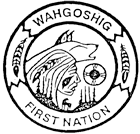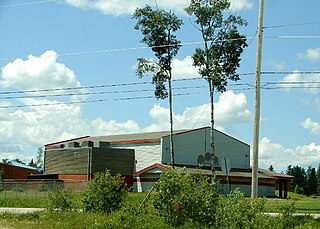
The Office of the United Nations High Commissioner for Human Rights, commonly known as the Office of the High Commissioner for Human Rights (OHCHR) or the United Nations Human Rights Office, is a department of the Secretariat of the United Nations that works to promote and protect human rights that are guaranteed under international law and stipulated in the Universal Declaration of Human Rights of 1948. The office was established by the United Nations General Assembly on 20 December 1993 in the wake of the 1993 World Conference on Human Rights.
The Métis Nation—Saskatchewan is a federally-recognized government that represents the approximately 80,000 Métis people in the province of Saskatchewan, Canada. It is affiliated with the Métis National Council. Glen McCallum was elected as president in 2017 and reelected in 2021.
Neskantaga First Nation is a remote Oji-Cree First Nation band government in the northern reaches of the Canadian province of Ontario, situated along the shore of Attawapiskat Lake in the District of Kenora.

The Kashechewan First Nation is a Cree First Nation band government located near James Bay in Northern Ontario, Canada. The community is located on the northern shore of the Albany River. Kashechewan First Nation is one of two communities that were established from Old Fort Albany in the 1950s. The other community is Fort Albany First Nation, which is now located on the southern bank of the Albany River. The community is connected to other towns along the shore of James Bay by the seasonal ice road/winter road, linking it to the towns of Attawapiskat, Fort Albany, and Moosonee.
In Canada, an Indian band or band, sometimes referred to as a First Nation band or simply a First Nation, is the basic unit of government for those peoples subject to the Indian Act. Bands are typically small groups of people: the largest in the country, the Six Nations of the Grand River First Nation had 22,294 members in September 2005, and many have a membership below 100 people. Each First Nation is typically represented by a band council chaired by an elected chief, and sometimes also a hereditary chief. As of 2013, there were 614 bands in Canada. Membership in a band is controlled in one of two ways: for most bands, membership is obtained by becoming listed on the Indian Register maintained by the government. As of 2013, there were 253 First Nations which had their own membership criteria, so that not all Status Indians are members of a band.
Eabametoong, also known as Fort Hope or Eabamet Lake by Canada Post, is an Ojibwe First Nations band government in Kenora District, Ontario, Canada. Located on the shore of Eabamet Lake in the Albany River system, the community is located approximately 300 km (190 mi) northeast of Thunder Bay and is accessible only by airplane via Fort Hope Airport or water, or by winter/ice roads, which connect the community to the Northern Ontario Resource Trail. The Eabametoong First Nation Reserve is completely surrounded by territory of the Unorganized Kenora District.
Poplar Hill First Nation is an Anishinaabe (Ojibway) First Nation band government, approximately 120 km north of Red Lake near the Ontario-Manitoba border. The First Nation is accessible by air and winter road. In May 2016, the First Nation had a registered population of 473 people.
Deer Lake First Nation is an Oji-Cree First Nations band government in Northern Ontario, located north of Red Lake, Ontario Canada. It is one of the few First Nations in Ontario to have signed Treaty 5. It is part of the Keewaytinook Okimakanak Council and the Nishnawbe Aski Nation. As of December, 2007, the First Nation had 1,072 registered members, of which their on-reserve population was 868.

Nishnawbe Aski Nation is a political organization representing 49 First Nation communities across Treaty 9 and Treaty 5 areas of Northern Ontario, Canada. Re-organized to its present form in 1981, NAN's original objective was "to represent the social and economic aspirations of our people at all levels of government in Canada and Ontario until such time as real effective action is taken to remedy our problems."
Marten Falls First Nation is an Anishinaabe First Nation reserve located in northern Ontario. The First Nation occupies communities on both sides of the Albany River in Northern Ontario, including Ogoki Post in the Cochrane District and Marten Falls in the Kenora District. As of December 2013, the First Nation had a total registered population of 728 people, of which their on-reserve population was 328 people.

Wahgoshig First Nation, formerly known as Abitibi-Ontario Band of Abitibi Indians or simply as Abitibi, is an Anishinaabe and Cree First Nation band governments whose reserve communities are located near Matheson in Cochrane District in northeastern Ontario, Canada. They have reserved for themselves the 7,770.1 hectares Abitibi Indian Reserve No. 70 on the south end of Lake Abitibi. In January 2008, the First Nation had 270 people registered with the nation, of which their on-reserve population was 121.
Keewaytinook Okimakanak Council is a non-political Chiefs Council in northwestern Ontario, Canada, serving its six member-First Nations. The council was organized in November 1991.

Constance Lake First Nation is an Oji-Cree First Nations band government located on the shores of Constance Lake near Hearst, Cochrane District in northeastern Ontario, Canada. It is directly north of the community of Calstock along a continuation of Ontario Highway 663. Constance Lake First Nation is home to close to 1605 members of Cree and Ojibway ancestry with approximately 820 living on reserve. It may also be known as "Home of Sonny Sutherland". The reserves, Constance Lake 92 and English River 66, total 7,686 acres (3,110 ha) in size.

Matawa First Nations, officially as the Matawa First Nations Management, Inc., is a non-profit Regional Chiefs' Council representing Ojibway and Cree First Nations in Northern Ontario, Canada. The Council provides advisory services and program delivery to its ten member-Nations.
Wabun Tribal Council is a non-profit Regional Chiefs' Council representing Ojibway and Cree First Nations in northern Ontario, Canada. The Council provides advisory services and program delivery to its seven Status and non-Status member-Nations.
Mushkegowuk Council, or officially as the Mushkegowuk Tribal Council, is a non-profit regional chiefs' council representing Cree First Nations in northern Ontario, Canada. The council, located in Moose Factory, Ontario provides advisory services and program delivery to its eight member nations.
Ogemawahj Tribal Council is a non-profit Regional Chiefs' Council representing Mississaugas, Ojibwa and Potawatomi First Nations in southern Ontario, Canada. The Council provides advisory services and program delivery to its six member-Nations.
Pwi-Di-Goo-Zing Ne-Yaa-Zhing Advisory Services is a non-profit Regional Chiefs' Council located in the Rainy River District, Ontario, Canada, serving seven First Nations by providing advisory services and training which will enhance the overall management skills and opportunities of the area's First Nations.
Pan-Indianism is a philosophical and political approach promoting unity, and to some extent cultural homogenization, among different Native American, First Nations, Inuit and Métis (FNIM) groups in the Americas regardless of tribal distinctions and cultural differences.
The Association of Iroquois and Allied Indians (AIAI) is a provincial territorial organization (PTO) mandated to defend and enhance the Indigenous and Treaty rights of its 7-member First Nations in Ontario, Canada.